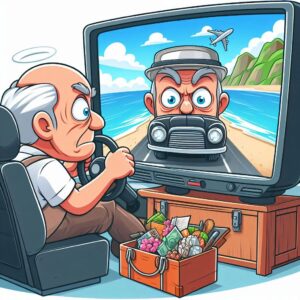
Hope for those who give up their car keys
When you are older, you are a threat to other drivers. Reflexes are dampened, muscle responses are sluggish, cataracts obscure vision, and inflexible eye lenses slow focus.
Cars are made to drive fast, and many whippersnappers navigate the streets like they are at the Indianapolis 500. How many times do you get tailgated and honked from behind when you are traveling at the posted speed limit?
And should there be an accident, because of your age, you will be blamed.
Yet, it’s unfair to place blame solely on age. We all strive to maintain our independence as we age and want to continue living life as we did when we were young. This desire for independence is something we can all empathize with and understand.
Too often, one of the great difficulties in life is prying the car keys away from your parents or grandparents. Solution: Have the government do it!
Why not utilize modern technology to help us out? Airplane pilots are continually tested for their abilities using “flight simulators.” Let’s make a “driver simulator” to test those who are older or might be at risk.
As a driver with a handicap permit issued by the DMV, I often wonder how they can be certain that I am still capable of driving a vehicle safely. The truth is, no one tests me for that. We need a fair and unbiased testing system that can provide reassurance and confidence to all drivers, regardless of age or ability.
Once grandpa reaches a certain age, or if someone like a doctor recognizes frailty that might result in an accident, the DMV can test a driver in a simulator for their driving ability.
Do they have these simulators now? Not that I am aware of. But if we had one, it would measure braking time, visual ability, and other variables needed to drive safely and put them on a point scale. Not enough points means you are not safe to drive, and the government would ask for the car keys and take the family off the hook!
Plus, this is a reality check for grandpa, and since the government is telling him this, he might be more willing to give up the car keys. Okay, you fastlane-technology-whippersnappers, let’s develop a driver simulator!
But what does grandpa do now other than sit at home and become depressed? Technology to the rescue again, with the autonomous self-driving car.
We see them all over California now, especially in Silicon Valley and Los Angeles. But the cost for one is over $70,000. Not too many seniors can afford that.
Can we be creative enough to develop a community autonomous car Co-Op that might allow, let’s say, 20 seniors to share the cost of a car? Once again, we need to develop a program where a group of seniors can share gas, insurance, maintenance, and parking so we can sustain our independence.
Help!
If I had an autonomous self-driving car, the first thing I would do is get a young whippersnapper to program it to drive over the speed limit, tailgate, and honk at the driver in front of me. That would definitely keep me from being depressed!
Gene Dorio, M.D.
Well written addressing aging vs. highways.
Great ideas. Love your blogs so sense able. Keep up the fantastic work.
Linda
Thanks Gene. A great telling of a concern most of us do need or will need to address.
I am of an age for there to be a concern so i have slowed down to within a reasonable proximity to the speed limit. (No worries about getting a ticket for excess speed. In California there is always someone needing to go faster.
I agree that one of the hardest things for adult children to do is to take the keys from a parent. My suggested solution would be to have a driving test beginning at about 60 when almost everyone can pass, and continue to test every 4-5 years until, say, 75 when the re-test happens at 2-year intervals.
You are on the spot with letting the government take the keys when appropriate. The aging parent and the adult children still need a close relationship.